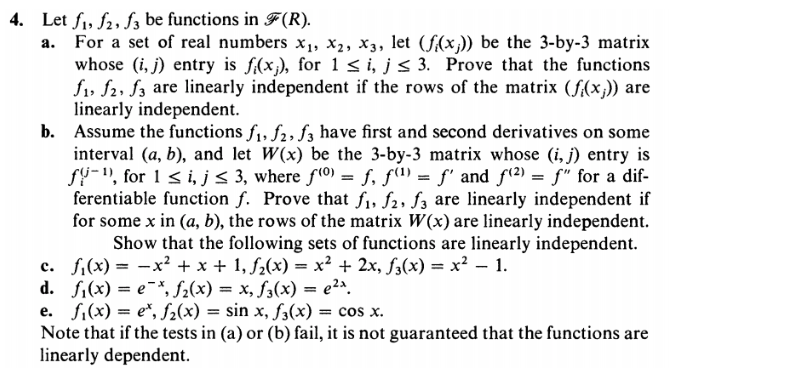Show that the following sets of functions are linearly independent. c. f,(x) = -x² + x + 1, f2(x) = x² + 2x, f3(x) = x² – 1. %3D %3D
Show that the following sets of functions are linearly independent. c. f,(x) = -x² + x + 1, f2(x) = x² + 2x, f3(x) = x² – 1. %3D %3D
Elementary Linear Algebra (MindTap Course List)
8th Edition
ISBN:9781305658004
Author:Ron Larson
Publisher:Ron Larson
Chapter6: Linear Transformations
Section6.4: Transistion Matrices And Similarity
Problem 15E
Related questions
Topic Video
Question
(C) Only

Transcribed Image Text:4. Let f1, f2, f3 be functions in F(R).
a. For a set of real numbers x, X2, X3, let (f(x,)) be the 3-by-3 matrix
whose (i, j) entry is f(x;), for 1 < i, js 3. Prove that the functions
f1, f2, f3 are linearly independent if the rows of the matrix (f(x;)) are
linearly independent.
b. Assume the functions f1, f2, f3 have first and second derivatives on some
interval (a, b), and let W(x) be the 3-by-3 matrix whose (i, j) entry is
fU-), for 1 < i, j< 3, where f(0) = f, f(1) = f' and f(2) = f" for a dif-
ferentiable function f. Prove that f, f2, f3 are linearly independent if
for some x in (a, b), the rows of the matrix W(x) are linearly independent.
Show that the following sets of functions are linearly independent.
c. f;(x) = -x² + x + 1, f2(x) = x² + 2x, f3(x) = x² – 1.
d. f,(x) = e¯*, f2(x) = x, f,(x) = e2ª.
e. fi(x) = e*, f2(x) = sin x, f3(x) = cos x.
Note that if the tests in (a) or (b) fail, it is not guaranteed that the functions are
linearly dependent.
%3D
Expert Solution
This question has been solved!
Explore an expertly crafted, step-by-step solution for a thorough understanding of key concepts.
Step by step
Solved in 2 steps

Knowledge Booster
Learn more about
Need a deep-dive on the concept behind this application? Look no further. Learn more about this topic, advanced-math and related others by exploring similar questions and additional content below.Recommended textbooks for you

Elementary Linear Algebra (MindTap Course List)
Algebra
ISBN:
9781305658004
Author:
Ron Larson
Publisher:
Cengage Learning

Linear Algebra: A Modern Introduction
Algebra
ISBN:
9781285463247
Author:
David Poole
Publisher:
Cengage Learning

Algebra & Trigonometry with Analytic Geometry
Algebra
ISBN:
9781133382119
Author:
Swokowski
Publisher:
Cengage

Elementary Linear Algebra (MindTap Course List)
Algebra
ISBN:
9781305658004
Author:
Ron Larson
Publisher:
Cengage Learning

Linear Algebra: A Modern Introduction
Algebra
ISBN:
9781285463247
Author:
David Poole
Publisher:
Cengage Learning

Algebra & Trigonometry with Analytic Geometry
Algebra
ISBN:
9781133382119
Author:
Swokowski
Publisher:
Cengage

Elements Of Modern Algebra
Algebra
ISBN:
9781285463230
Author:
Gilbert, Linda, Jimmie
Publisher:
Cengage Learning,